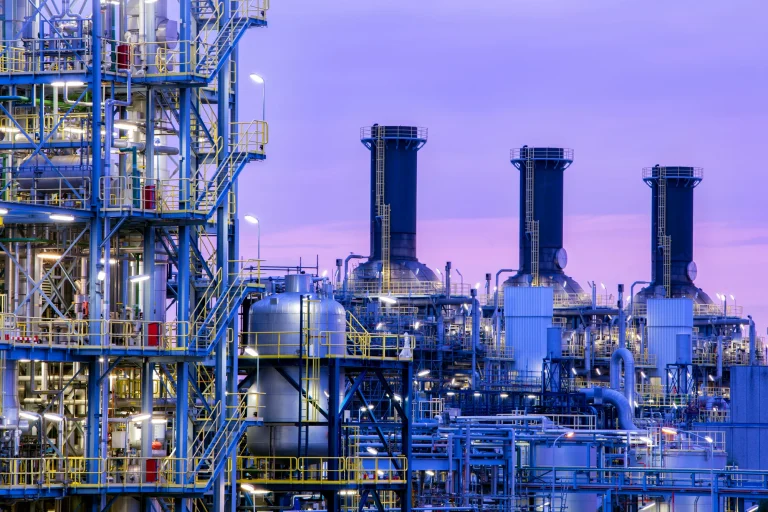Several different processing methods are used to get petrochemicals out of oil. These chemicals are very important to modern industry. A broad term for many different types of substances, “chemicals” includes fuels, lubricants, and organic intermediates. All of these are important parts of many different industries. Because this book covers so much ground, it lets us dive into the world of petrochemicals and look at the different kinds of these chemicals, how they are used, and how important they are in today’s business world.
Types of Petrochemicals
Fuels
As energy sources, fuels are some of the most well-known petrochemicals. They are used for things like transportation, heating, and making power. Fuels are used in all three of these situations in some way. A few common types of fuels that are made from petroleum are gasoline, diesel, jet fuel, and liquid petroleum gas (LPG). Car fuels like gasoline and diesel are also in this group. These fuels are used to power cars, planes, ships, and other machinery, which in turn boosts economies around the world.
Lubricants
Lubricants are very important because they keep moving parts in engines and other machines from wearing out too quickly. Lubricants keep moving parts sealed and safe. Lubricants are also used in the manufacturing industry. The equipment is protected from further damage, it can do more work, and it will last longer. Many different kinds of oils are made from petrochemicals, and each one is different from the others. In this group are different kinds of grease, gear oils, hydraulic fluids, and motor oil, among others. When these oils were made, they were made to meet certain performance standards in a lot of different situations.
Petrochemical Intermediates
Petrochemical intermediates can be used to make drugs, manufactured fabrics, plastics, and rubber, among other things. These intermediates are very important parts of the production process. Some chemicals that are thought to be intermediate components are ethylene, propylene, benzene, and toluene. These molecules are then put through more steps of processing in order to make plastics, resins, and specialty chemicals.
Applications of Petrochemicals
Plastics and Polymers
The plastics industry is built on top of the petroleum business. Polymers like polyethylene, polypropylene, and polyvinyl chloride (PVC) are in almost all of the things people use every day. Plastics are used in a huge variety of situations because they are flexible, long-lasting, and inexpensive. This material can be used for many things, such as building materials, car parts, electrical parts, and packing.
Synthetic Fibers
A lot of manufactured fibers are made from petrochemicals and are used to make clothes, fabrics, and non-woven materials. There are a lot of different kinds of manufactured fibers, such as polyester, nylon, and acrylic. The fashion and textile industries are using these fibers to drive innovation because they have benefits like being strong, long-lasting, and resistant to wrinkling and spots. This is why these fibers are good for you.
Chemical Manufacturing
Petrochemicals are used as raw materials to make a lot of different chemicals that are used in many different fields. There are many fields that use these drugs. Because they are used to make solvents, glue, soaps, fertilizers, herbicides, and medicines, they have made a big difference in the fields of agriculture, medicine, and consumer goods.
Construction Materials
Polymers, glue, and insulation are all examples of things made from petrochemicals that are very important in the building business. Each of these things is an example of a product. Because they are strong, flexible, and don’t rust or break down easily when exposed to chemicals or water, these materials are used for things like pipes, fittings, insulation, seals, and coats. Pipes are known for being very strong and flexible.
Importance of Petrochemicals in Modern Industry
Economic Impact
These chemicals are very important to the world’s economy because they help businesses that are worth billions of dollars. In many fields, like building, manufacturing, transportation, and energy, they help the economy grow, create new jobs, and encourage new ideas.
Technological Advancements
It is much easier to study and create new materials, items, and methods when petrochemicals are used. This is the case because petrochemicals are easy to work with. These technologies have made it possible to create lightweight materials, high-performance plastics, and new technologies that make things more efficient, environmentally friendly, and competitive. Using these technologies together also makes it possible to make one-of-a-kind technology.
Energy Security
One way that petrochemicals help improve energy security is by making sure that there are reliable sources of fuel and power. Because of this, they help us become strong and energy independent, depend less on oil from other countries, and spread out the energy sources we use.
Environmental Considerations
Even though there are some good things about using petrochemicals, there are also some bad things the world that happen when they are made and used. Some of these problems are the release of carbon dioxide, the damage to the environment, and the use up of resources. Several projects are trying to lessen the effects of these issues. Some of these tactics are encouraging recycling and activities that take place in the cycle economy, making practices that last, and making energy use more efficient.
Conclusion
The fact that petrochemicals provide fuels, lubricants, and intermediates makes them an important part of modern industry. There is growth in the business, the development of new tools, and the progress of society from these three things. The production of manufactured fabrics and plastics, as well as the production of chemicals and building materials, uses petrochemicals in almost every role we play. Polymers and man-made fabrics are just two examples. It is very important to have a good understanding of the different kinds of chemicals, how they are used, and why they are important in industrial chemistry in order to navigate it effectively.
